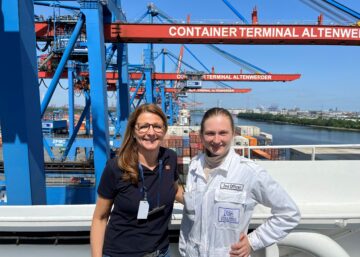Manager believes green services sector is set to take off as owners seek ship scrapping solutions amid tighter regulations and capacity shortage
CSM Energy — the offshore management firm established last year by Columbia Shipmanagement — is gearing up for an upturn in recycling and environmental-related business.
It believes the economic fallout from the Covid-19 pandemic is raising the prospect of accelerated offshore decommissioning, at a time when certified “green” recycling yards are full and environmental regulation is playing an ever-greater role in deciding where and how vessels are scrapped.
In a bid to help owners overcome these regulatory complexities, CSM Energy has now teamed up with green recycling consultancy GSR Services.
Opportunities coming up

CSM Energy chief executive Joachim Brack said: “A lot of business opportunities are coming up, we think a lot of vessels that are in cold lay up won’t find work again.”
However, increasing environmental regulation has made recycling a complicated business, according to GSR managing director Henning Gramann.
He said the entry into force of the Basel Convention Ban Amendment and the European Union’s Ship Recycling Regulation last year has been responsible for congestion that is now appearing at recycling yards in Turkey. Most breaking yards in the country are approved under both pieces of legislation.
“Yards in Turkey are backed up two months to half a year,” Gramann said. “This has become a real challenge because EU legislators have underestimated the early entry into force of the Basel Amendment.”
As well as recycling capacity, owners are also required to comply with the EU’s Inventory of Hazardous Materials (IHM) regulation, which will now be enforced from June 2021 after the European Commission recently granted an extension in consideration of the inspection problems caused by the pandemic.

The extra time will be useful as Gramann estimates that somewhere between 30% and 50% of owners have still not completed the IHM auditing.
GSR Services managing director Henning Gramann said shipowners need to act soon to meet incoming regulation on maintaining an Inventory of Hazardous Materials. Photo: Tan Yun Qin
Gramann said there is a lack of knowledge about how to comply but also the possible penalties, including criminal sanctions, for non-compliance.
Criminal penalties
“There is a huge lack of awareness about IHM and [a] lot of owners and managers don’t know [that] it is not just a monetary penalty,” he said.
Good planning is the key to IHM compliance, with ship recycling regulation and owners still have a chance to meet deadlines.
“It will need good circumstances [to comply in time] but a lot depends on whether the classification society has time to inspect the ships,” he said.
Brack said environmental compliance is now a critical part of the work of ship managers.
He added that this spans environmental waste management to the increasingly routine use of digital ship-to-shore communication tools for energy efficiency management.
“Today, shipowners need to have a connected ship, it is not just a vision for the future,” he said.
The company has also introduced specialist training for crew to eradicate oily water separator pollution violations under its internal training scheme, which it has called Never Again.
Brack said the scheme had completely changed its “way of management”.
He is also advocating the employment of an environmental compliance manager at shipping companies. The role would support environmental compliance in the same way that a designated person ashore manages safety.
By Adam Corbett, Tradewinds





